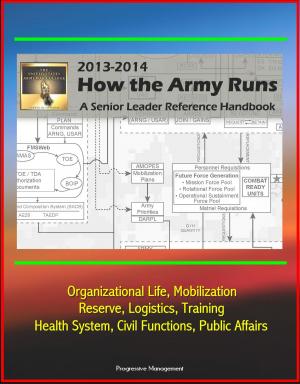Manufacturing the Horns of Dilemma: A Theory of Operational Initiative – Case Studies of Grant's 1864 Overland Campaign, Eighth Army in Korean War, Israeli-Hezbollah War of 2006
Nonfiction, History, Military, United States, World War II| Author: | Progressive Management | ISBN: | 9781370096336 |
| Publisher: | Progressive Management | Publication: | February 11, 2017 |
| Imprint: | Smashwords Edition | Language: | English |
| Author: | Progressive Management |
| ISBN: | 9781370096336 |
| Publisher: | Progressive Management |
| Publication: | February 11, 2017 |
| Imprint: | Smashwords Edition |
| Language: | English |
This excellent report has been professionally converted for accurate flowing-text e-book format reproduction. Initiative is a long debated aspect of warfare and most practitioners of warfare agree that it is better to have the initiative than not. How then does an army get the initiative during a campaign? Theory and doctrine do not offer holistic theories about initiative but rather varying definitions of what it is and why it is important to have it.
This monograph proposes a theory of initiative that states that an army can seize, retain, and exploit the operational initiative by constant reorientation that fosters aligning its operational concept against its opponent's limitations and weaknesses, and limits an opponent's freedom of action through the arrangement of tactical actions to reduce key opponent capabilities.
Three case studies will be utilized to support this theory. The first, Grant's 1864 Overland Campaign will demonstrate how an army seized and retained the initiative throughout the duration of the campaign. The second case study will detail Eighth Army in Korea, and highlight an army that re-seized the operational initiative in the midst of a campaign. The final case study, the Israeli-Hezbollah War of 2006, will show a technologically superior army failing to seize the operational initiative throughout the course of a campaign.
The conclusion of this monograph argues that the two most significant implications of this theory are that an army's ability to reorient during combat operations is just as critical, if not more so than its operating concept. Secondly, political considerations can be just as detrimental to an army's freedom of action as the loss of tactical capabilities through engagements.
The Overland Campaign * Campaign Synopsis * Orientation: A Plan to Isolate the Army of Northern Virginia * Limiting Lee's Freedom of Action: Preventing the Counterattack * Eighth Army in Korea * Campaign Synopsis * Orientation: Rebuilding the American Steamroller * Limiting CCF Freedom of Action: Deal Out Maximum Damage at Minimal Cost * The 2006 IDF-Hezbollah War * Campaign Synopsis * Orientation: The Failure of New Ideas Against an Old Threat * Limiting Freedom of Action: IDF Constraints and Limitations * Conclusion
This excellent report has been professionally converted for accurate flowing-text e-book format reproduction. Initiative is a long debated aspect of warfare and most practitioners of warfare agree that it is better to have the initiative than not. How then does an army get the initiative during a campaign? Theory and doctrine do not offer holistic theories about initiative but rather varying definitions of what it is and why it is important to have it.
This monograph proposes a theory of initiative that states that an army can seize, retain, and exploit the operational initiative by constant reorientation that fosters aligning its operational concept against its opponent's limitations and weaknesses, and limits an opponent's freedom of action through the arrangement of tactical actions to reduce key opponent capabilities.
Three case studies will be utilized to support this theory. The first, Grant's 1864 Overland Campaign will demonstrate how an army seized and retained the initiative throughout the duration of the campaign. The second case study will detail Eighth Army in Korea, and highlight an army that re-seized the operational initiative in the midst of a campaign. The final case study, the Israeli-Hezbollah War of 2006, will show a technologically superior army failing to seize the operational initiative throughout the course of a campaign.
The conclusion of this monograph argues that the two most significant implications of this theory are that an army's ability to reorient during combat operations is just as critical, if not more so than its operating concept. Secondly, political considerations can be just as detrimental to an army's freedom of action as the loss of tactical capabilities through engagements.
The Overland Campaign * Campaign Synopsis * Orientation: A Plan to Isolate the Army of Northern Virginia * Limiting Lee's Freedom of Action: Preventing the Counterattack * Eighth Army in Korea * Campaign Synopsis * Orientation: Rebuilding the American Steamroller * Limiting CCF Freedom of Action: Deal Out Maximum Damage at Minimal Cost * The 2006 IDF-Hezbollah War * Campaign Synopsis * Orientation: The Failure of New Ideas Against an Old Threat * Limiting Freedom of Action: IDF Constraints and Limitations * Conclusion















